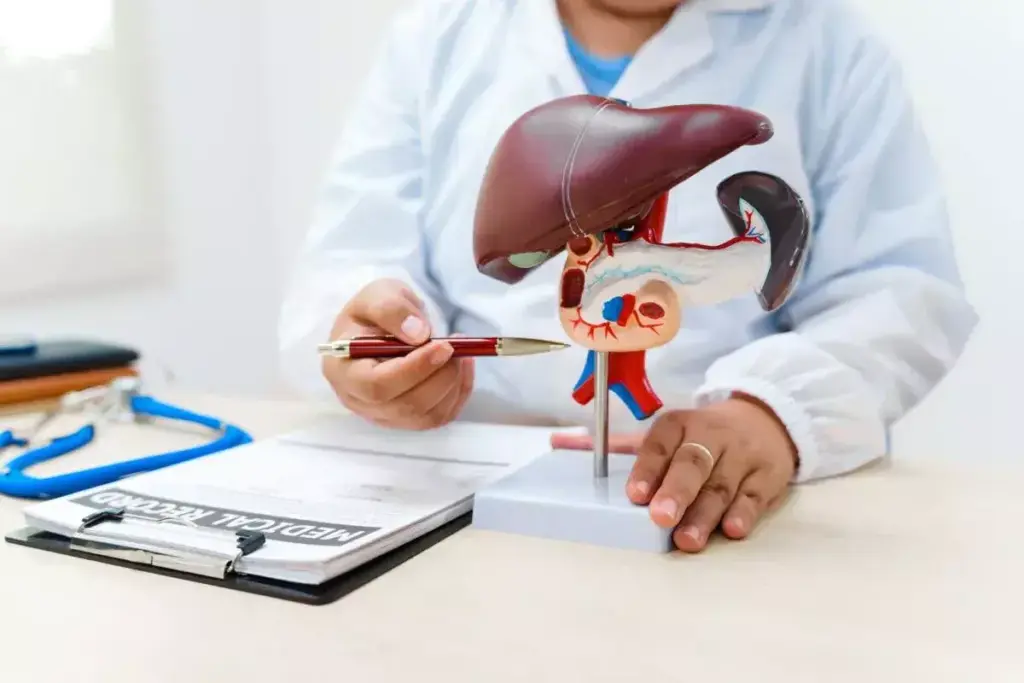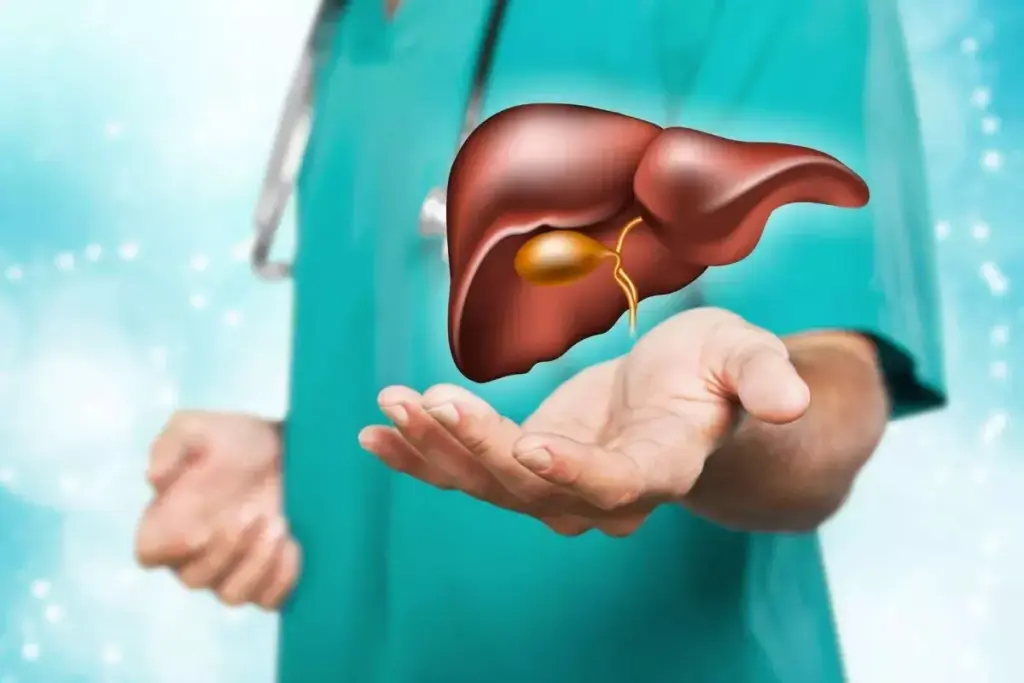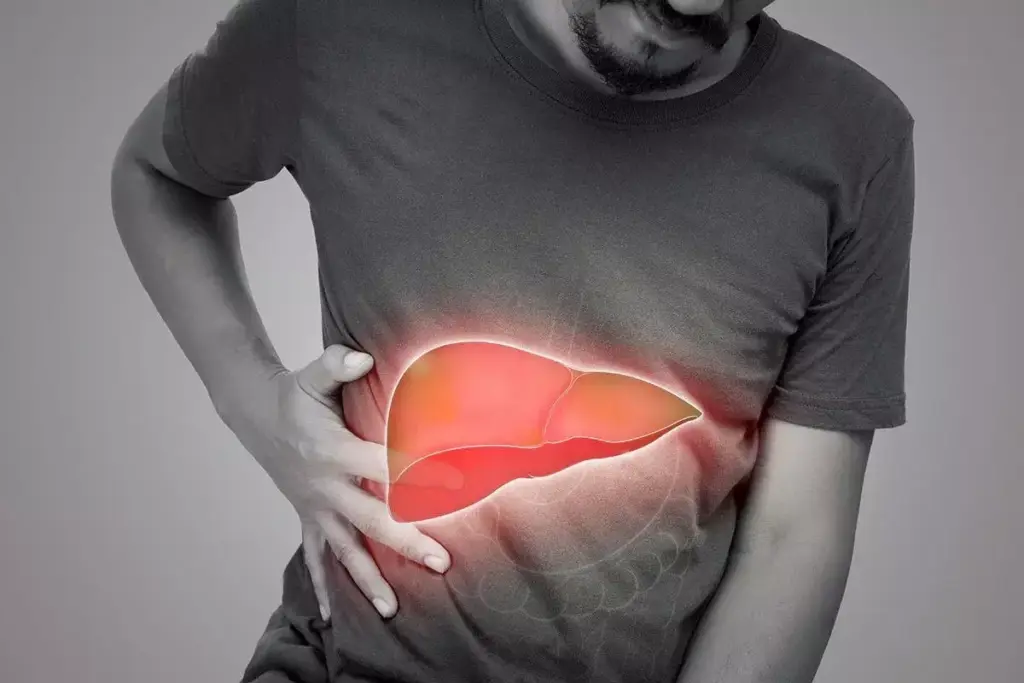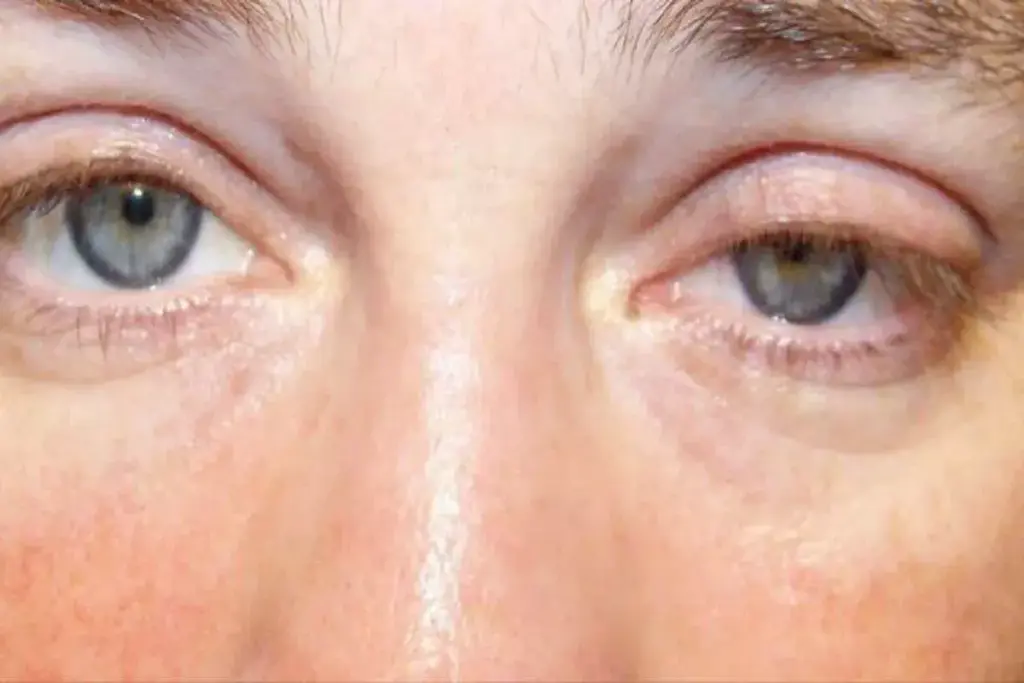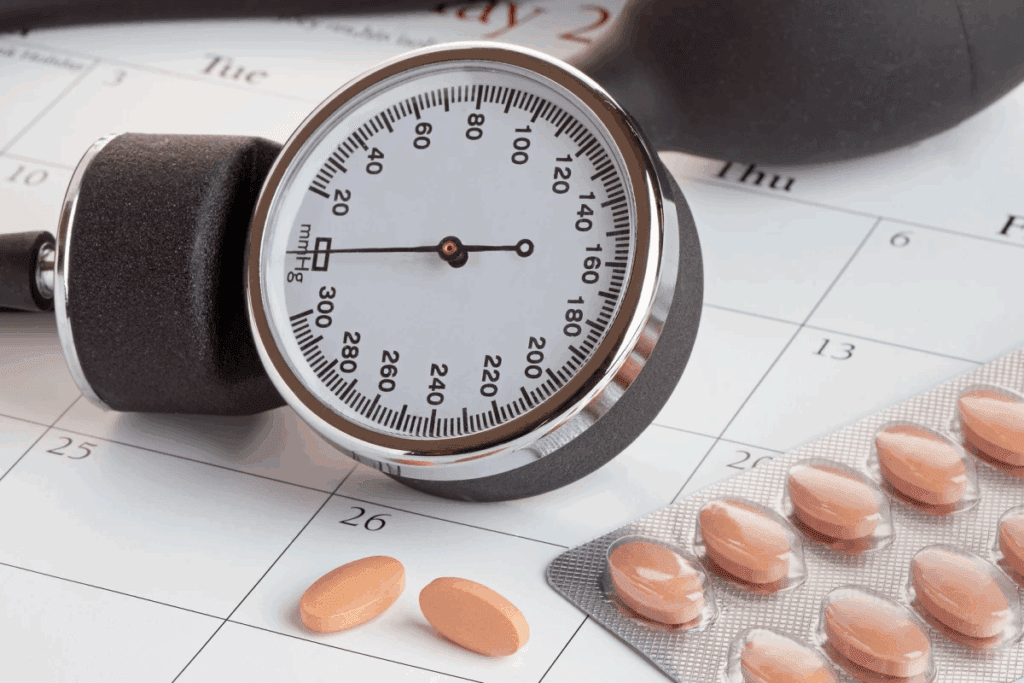
Erectile dysfunction is a big problem for many men, hitting them hard between 40 and 70. Studies show that around 50% of men in this age group face some form of erectile dysfunction. Can blood pressure medicine cause impotence? See a list of 12 medications that are known to cause or contribute to erectile dysfunction.
Medication-induced erectile dysfunction is a growing worry, with about 25% of cases linked to prescription drugs. Some blood pressure medications can mess with sexual function, causing erectile dysfunction.
We will look at 12 blood pressure medications that might lead to erectile dysfunction. We’ll dive into the risks and explore better ways to manage high blood pressure without hurting your sex life.
Key Takeaways
- Erectile dysfunction is a common condition affecting 50% of men between 40 and 70 years old.
- About 25% of erectile dysfunction cases are caused by prescription medications.
- Certain blood pressure medications can cause erectile dysfunction.
- Newer medications may control hypertension without sacrificing sexual health.
- Understanding the risks and alternatives is key for managing hypertension and keeping sexual function intact.
The Relationship Between Blood Pressure Medication and Erectile Dysfunction
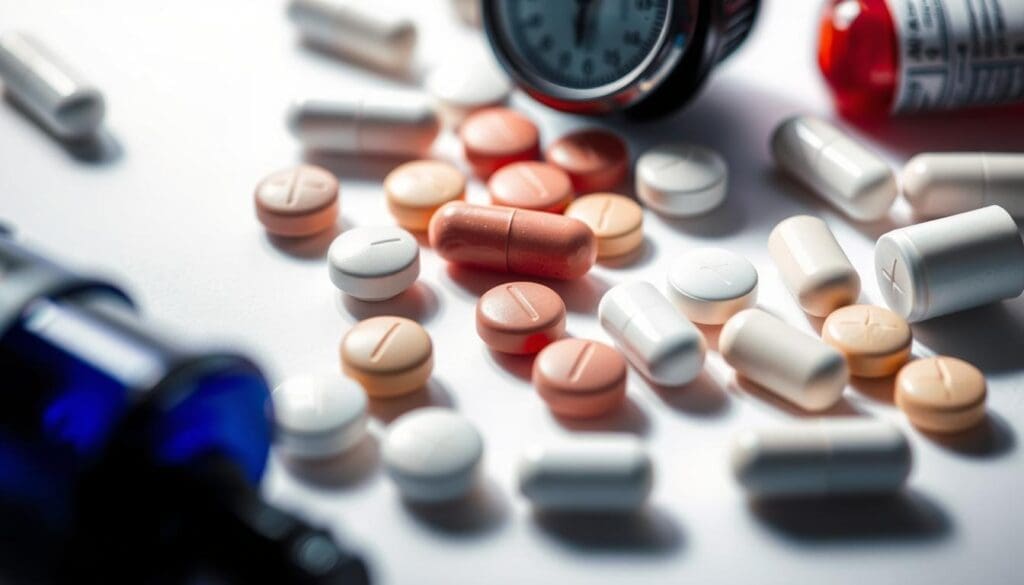
Many men worry about the link between blood pressure meds and erectile dysfunction. High blood pressure, or hypertension, is common and affects millions. Treating it is key to avoid heart problems, but some meds can cause ED.
Research shows different blood pressure meds affect men differently. Older meds like some beta-blockers and diuretics are more likely to cause ED. Knowing this helps doctors and patients choose the right treatment for high blood pressure.
Statistics on Medication-Induced ED in Men with Hypertension
Men with high blood pressure are more likely to have ED than others. Some blood pressure meds make this problem worse. For example, beta-blockers like propranolol are linked to more ED cases than other meds.
How these meds cause ED is complex. They can mess with blood flow, hormone levels, or signals in the brain needed for an erection.
Why Treating Hypertension Remains Essential Despite Side Effects
Even with the risk of ED, not treating high blood pressure is risky. It can lead to heart disease, stroke, and kidney problems. So, managing it is vital for health.
Doctors try to find the right balance for treating high blood pressure without harming sex life. They might change meds, doses, or try other treatments with fewer side effects. It’s all about what’s best for each person’s health.
How Antihypertensive Drugs Affect Sexual Function
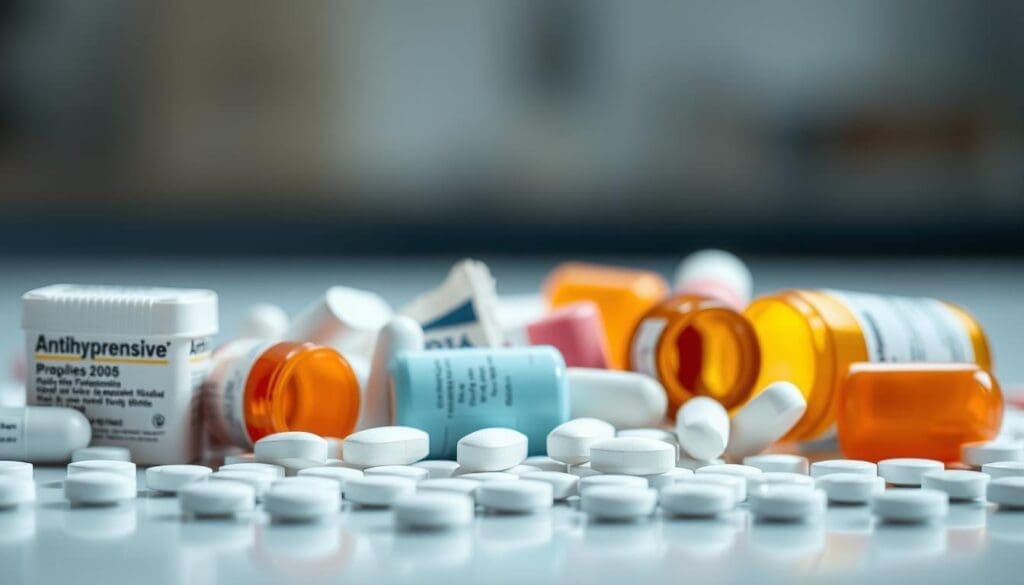
Antihypertensive medications can affect sexual function in different ways. This can lead to erectile dysfunction (ED). We will look at how this happens and who is more likely to experience these side effects.
Physiological Mechanisms Behind Medication-Induced ED
These drugs can cause erectile dysfunction through several ways. They can reduce blood flow to the penis, change hormones, and affect the nervous system. For example, diuretics and beta-blockers can lead to ED by lowering blood flow and harming vascular health.
The drugs’ impact on the body’s ability to get and keep an erection is key. Beta-blockers, for instance, can make it harder to get an erection. This is because they slow the heart rate and reduce the force of heart contractions, leading to less blood flow.
Risk Factors That Increase Susceptibility to Sexual Side Effects
Some factors make it more likely to experience sexual side effects from these drugs. These include age, health conditions like diabetes, and heart disease.
| Risk Factor | Description | Impact on Sexual Function |
| Age | Older adults are more likely to experience side effects from these drugs. | Increased risk of erectile dysfunction |
| Diabetes | Diabetes can damage blood vessels and nerves, affecting erectile function. | Higher likelihood of sexual dysfunction |
| Cardiovascular Disease | Conditions like atherosclerosis can impair blood flow, contributing to ED. | Reduced erectile function due to compromised blood flow |
Knowing these risk factors and how the drugs work can help doctors and patients. It can help in managing high blood pressure and reducing sexual side effects.
Beta-Blockers: The Most Common ED-Causing Culprits
Research shows beta-blockers, key in treating high blood pressure, can lead to erectile dysfunction. These drugs are used to control blood pressure and heart conditions. Yet, they can harm sexual function significantly.
1. Propranolol (Inderal): ED Incidence and Mechanism
Propranolol, a non-selective beta-blocker, is used for high blood pressure and heart issues. It can cause erectile dysfunction in some men. This is because it makes it hard for blood vessels to relax, a key for an erection.
Clinical evidence shows many men taking propranolol face erectile dysfunction. This is mainly because of its effect on the nitric oxide pathway, vital for erections.
2. Metoprolol (Lopressor, Toprol-XL): Impact on Sexual Function
Metoprolol, another beta-blocker, is linked to erectile dysfunction. It comes in Lopressor and Toprol-XL forms. Though generally safe, it can affect sexual function for some men.
Research indicates metoprolol can reduce erectile function. It does this by making it hard to achieve and keep an erection. The exact reason is not fully known but is linked to its beta-blocking action.
3. Atenolol (Tenormin): Research on Sexual Side Effects
Atenolol, a selective beta-1 blocker, treats high blood pressure and angina. Studies on its sexual side effects are mixed. Yet, some research suggests it can cause erectile dysfunction in some men.
The impact of atenolol on sexual function is thought to be less than non-selective blockers like propranolol. Yet, individual reactions can vary, and some men may experience sexual side effects.
Why Beta-Blockers Frequently Cause Sexual Dysfunction
Beta-blockers can lead to sexual dysfunction in several ways. They can make it hard for blood vessels to relax, needed for an erection. They can also affect hormone levels, including testosterone, important for sex.
Also, beta-blockers can have a psychological impact on men, causing anxiety and stress. This can worsen erectile dysfunction. Knowing how they work is key to managing their sexual side effects.
Diuretics That Significantly Impact Erectile Function
Diuretics are key in controlling high blood pressure. But, they can also affect erectile function. It’s important to know which medications might cause these issues.
Hydrochlorothiazide (HCTZ): Prevalence of ED Side Effects
Hydrochlorothiazide is a common diuretic for high blood pressure. Yet, it can lead to erectile dysfunction in some. The risk of ED side effects with HCTZ varies, but it’s something patients should be aware of.
“The use of hydrochlorothiazide has been linked to a higher risk of erectile dysfunction, mainly at higher doses,” experts say.
Chlorthalidone (Thalitone): Comparison to Other Diuretics
Chlorthalidone is another diuretic studied for its effects on erectile function. It has a similar risk of causing ED as other diuretics. Patients on chlorthalidone should watch for signs of erectile dysfunction.
Spironolactone (Aldactone): Hormonal Effects and ED
Spironolactone, known for its potassium-sparing effects, can affect hormone levels. This hormonal change can sometimes cause erectile dysfunction. It’s important to consider the benefits and sexual side effects of spironolactone.
As Medical Expert, “Spironolactone’s anti-androgen effects can lead to erectile dysfunction in some men. This makes it a key factor in treatment plans.”
How Diuretics Affect Hormones and Blood Flow
Diuretics can impact erectile function in several ways, including hormone and blood flow changes. Understanding these effects helps healthcare providers manage diuretic therapy risks.
- Diuretics can cause dehydration, which might reduce blood flow to the penis.
- Hormonal changes, like those from potassium-sparing diuretics like spironolactone, can affect libido and erectile function.
- The overall vascular health impact of diuretics also plays a role in their effect on erectile function.
In summary, while diuretics are important for managing high blood pressure, their risk of causing erectile dysfunction should not be overlooked. Patients and healthcare providers must work together to monitor and manage these side effects.
ACE Inhibitors Associated with Erectile Dysfunction
The link between ACE inhibitors and erectile dysfunction is complex. Different ACE inhibitors have different effects on sexual function. These drugs relax blood vessels to lower blood pressure. While they often have few sexual side effects, experiences can vary.
Lisinopril (Prinivil, Zestril): Frequency of Sexual Side Effects
Lisinopril is a common ACE inhibitor. Studies show it has a low rate of sexual side effects. In trials, its rate of erectile dysfunction was similar to or slightly higher than the placebo.
Enalapril (Vasotec): Clinical Studies on ED Risk
Enalapril is another popular ACE inhibitor. Research shows it’s not linked to a higher risk of erectile dysfunction. Some studies even suggest it might help sexual function by improving blood flow.
Variations in Sexual Side Effects Among Different ACE Inhibitors
ACE inhibitors are generally safe for sexual function, but there are differences. The drug’s structure, how it’s absorbed, and its effects on tissues can affect erectile dysfunction risk.
To show the differences, let’s compare lisinopril and enalapril:
| ACE Inhibitor | Frequency of ED | Notable Effects |
| Lisinopril | Low | Comparable to placebo in clinical trials |
| Enalapril | Low to None | May improve blood flow, potentially benefiting sexual function |
In summary, ACE inhibitors are usually safe for erectile function. But, the specific drug and patient factors can affect side effects. Doctors should consider these when prescribing to patients with erectile dysfunction concerns.
Calcium Channel Blockers That May Cause ED
Calcium Channel Blockers are often used to treat high blood pressure. They might cause erectile dysfunction in some people. Even though they have fewer side effects than some other blood pressure medicines, they can affect sexual health.
These drugs work by stopping calcium from entering muscle cells in the heart and blood vessels. This action lowers blood pressure and resistance in blood vessels. But, how they affect erections can vary a lot.
Diltiazem (Cardizem): Mechanism of ED Development
Diltiazem is used for high blood pressure, chest pain, and some heart rhythm problems. It might cause erectile dysfunction by widening blood vessels and affecting the nervous system.
The drug’s ability to widen blood vessels can lower blood pressure. This might reduce blood flow to the penis, making it harder to get an erection. It could also mess with the nervous system’s role in getting an erection.
Amlodipine (Norvasc): Incidence Rates and Risk Factors
Amlodipine is used for high blood pressure and chest pain. Studies show it might not cause erectile dysfunction as often as other drugs. But, it can affect sexual function in some people.
Older age, diabetes, heart disease, and other medicines can increase the risk of erectile dysfunction with amlodipine.
Why Some Calcium Channel Blockers Affect Sexual Function
Why some Calcium Channel Blockers affect sexual function more than others is complex. It depends on the drug’s properties, how it affects blood vessels, and the person taking it.
To understand how different Calcium Channel Blockers affect erections, let’s look at the data in the table below:
| Calcium Channel Blocker | Incidence of ED | Mechanism |
| Diltiazem | Moderate | Vasodilation, autonomic effects |
| Amlodipine | Low to Moderate | Vasodilation |
| Nifedipine | Low | Vasodilation |
This table shows how different Calcium Channel Blockers might affect erections. It points out the differences in risk and the importance of considering each person’s situation.
Alpha-Blockers and Centrally Acting Agents
Alpha-blockers and centrally acting agents are used to treat high blood pressure. They can cause sexual side effects, like erectile dysfunction. It’s important for doctors and patients to think about these effects.
Clonidine (Catapres): Central Nervous System Effects on Arousal
Clonidine is a medication that affects the brain and can impact sexual function. Research shows it can cause erectile dysfunction in some patients by changing how neurotransmitters work.
The way clonidine affects sex is complex. It involves the brain and nerves. It’s thought to affect the brain’s alpha-2 adrenergic receptors, leading to less libido and erectile issues.
Methyldopa (Aldomet): Historical Data on Sexual Dysfunction
Methyldopa has been used to treat high blood pressure. Studies show it can cause sexual problems, including erectile dysfunction, in many patients. The exact reason is not clear, but it’s believed to be related to changes in brain chemicals.
Old studies on methyldopa’s side effects are important. They show the risks of sexual problems with certain blood pressure medicines. They remind us to watch for sexual issues in patients taking these drugs.
Neurological Pathways Affected by These Medications
Clonidine and methyldopa can affect the nerves involved in sex. The brain controls sex through a balance of chemicals and hormones. These medicines can upset this balance, causing erectile dysfunction.
- Clonidine affects alpha-2 adrenergic receptors in the brain.
- Methyldopa influences central neurotransmitter levels.
- Both can impact sympathetic outflow and erectile response.
Knowing how these medicines work is key to managing their sexual side effects. Doctors should think about these risks when prescribing these drugs to patients who might have erectile issues.
Alternative Blood Pressure Medications Less Likely to Cause ED
For those worried about erectile dysfunction, there are better blood pressure meds. It’s key to manage high blood pressure well without harming sex life. We’ll look at blood pressure drugs that are less likely to cause ED.
Angiotensin Receptor Blockers (ARBs): Losartan and Valsartan
ARBs are a good choice for treating high blood pressure with less risk of ED. Losartan and valsartan are two ARBs that are better for sex. They help control blood pressure and might protect against ED.
Studies show ARBs like losartan and valsartan have fewer ED cases than other meds. A study on losartan found it greatly reduced ED risk compared to beta-blockers. Valsartan also improved erectile function in some trials.
Newer Generation Medications with Improved Side Effect Profiles
Newer blood pressure meds aim to work better with fewer side effects, including ED. These include newer ARBs and other drugs designed for better tolerance and patient adherence.
- Direct renin inhibitors, like aliskiren, are another type of blood pressure drug with a good side effect profile.
- Some calcium channel blockers, like those with longer action, are also thought to have a lower risk of ED.
Combination Therapies That Minimize Sexual Side Effects
Using a mix of blood pressure meds at lower doses can reduce side effects, including ED. This method helps control blood pressure without the full impact of high doses of one drug.
Combining an ARB with a calcium channel blocker or a diuretic at a lower dose is effective. For example, mixing losartan with a low-dose diuretic can control blood pressure well while lowering ED risk.
Strategies for Managing ED Caused by Blood Pressure Medications
Erectile dysfunction is a common issue for men on blood pressure meds. There are ways to tackle it. It’s about tweaking meds and changing your lifestyle.
Having an Informed Conversation with Your Healthcare Provider
Talking to your doctor about ED can be tough. But it’s key to finding a fix. Your doctor can check if your meds are causing ED and suggest other options.
Medication Adjustments, Timing, and Dosage Considerations
Changing your meds might help with ED. You might switch to meds with less sexual side effects. The timing and amount of your meds also play a role in how they affect your erections.
| Medication Class | Examples | Impact on ED |
| ACE Inhibitors | Lisinopril, Enalapril | Generally fewer sexual side effects |
| Angiotensin Receptor Blockers | Losartan, Valsartan | May improve erectile function |
| Beta-Blockers | Propranolol, Metoprolol | More likely to cause ED |
Lifestyle Modifications That Improve Both Hypertension and Sexual Function
Healthy living can boost both blood pressure and sex life. Exercise, a good diet, a healthy weight, and quitting smoking help a lot.
When to Consider ED Medications as an Adjunct Therapy
In some cases, ED meds like sildenafil or tadalafil might be suggested. Always talk to your doctor about this to make sure it’s safe and works well.
By teaming up with your doctor and making smart choices about meds and lifestyle, you can manage ED from blood pressure meds. This improves your life quality a lot.
Conclusion
It’s key to understand how blood pressure meds and erectile dysfunction are linked. Some blood pressure drugs, like beta-blockers and diuretics, can cause ED. This is important for managing both high blood pressure and sexual health.
Dealing with ED caused by blood pressure meds needs a team effort. Patients should talk openly with their doctors about side effects. They should look into other treatments or changes to their meds.
Changing your lifestyle and trying other therapies can help. It’s vital to focus on both controlling high blood pressure and improving sexual health. This keeps you feeling your best overall.
We stress the need for teamwork between patients and doctors. This is to tackle the link between blood pressure meds and ED. It’s all about bettering life quality for those affected.
FAQ
What are the most common blood pressure medications that can cause erectile dysfunction?
Beta-blockers, diuretics, and certain ACE inhibitors are often linked to erectile dysfunction.
Can beta-blockers cause erectile dysfunction?
Yes, beta-blockers like propranolol, metoprolol, and atenolol can lead to erectile dysfunction. They affect blood flow and hormone levels.
How do diuretics affect erectile function?
Diuretics like hydrochlorothiazide and chlorthalidone can cause erectile dysfunction. They alter hormone levels and reduce blood flow to the penis.
Are ACE inhibitors a common cause of erectile dysfunction?
ACE inhibitors like lisinopril and enalapril are less likely to cause erectile dysfunction. But, some people may experience sexual side effects.
Can calcium channel blockers cause erectile dysfunction?
Yes, certain calcium channel blockers like diltiazem and amlodipine can cause erectile dysfunction. The rates vary.
What are the alternative blood pressure medications that are less likely to cause erectile dysfunction?
Angiotensin receptor blockers (ARBs) like losartan and valsartan are considered safer for erectile function.
How can I manage erectile dysfunction caused by blood pressure medications?
You can manage erectile dysfunction by talking to your healthcare provider. Adjust your medication and make lifestyle changes.
Can lifestyle changes help alleviate erectile dysfunction caused by blood pressure medications?
Yes, regular exercise, a balanced diet, and stress reduction can improve both hypertension and sexual function.
When should I consider ED medications as an adjunct therapy?
Consider ED medications if your erectile dysfunction persists. This is after adjusting your medication and making lifestyle changes.
What should I discuss with my healthcare provider about my erectile dysfunction?
Discuss your symptoms, medication, and lifestyle factors with your healthcare provider.
Can blood pressure medications cause permanent erectile dysfunction?
In some cases, blood pressure medications can cause persistent erectile dysfunction. But, it’s not always permanent. It may be reversible with medication adjustments or lifestyle changes.
Are there any new blood pressure medications that do not cause erectile dysfunction?
Newer medications like ARBs have improved side effect profiles. They are less likely to cause erectile dysfunction.
References
National Center for Biotechnology Information. (2025). 12 Blood Pressure Medications That Can Cause Erectile. Retrieved from https://www.ncbi.nlm.nih.gov/pmc/articles/PMC8109585/



